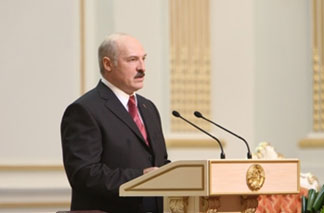General information
GENERAL INFORMATION
 “Science in our republic plays a significant role, and we invest funds in it. Belarus does not have those natural resources that other states have, we have always placed emphasis on the nation’s intellect and people’s hard work”
“Science in our republic plays a significant role, and we invest funds in it. Belarus does not have those natural resources that other states have, we have always placed emphasis on the nation’s intellect and people’s hard work”
Alexander Lukashenko
The Head of State believes Belarusian science is a powerful intellectual industry that is developing, primarily with an eye towards the practice, implementation of the results of research and development into the production and training process. In the country today, there are 340 science and research organizations and nearly 25 thousand scientific workers, graduate and doctoral students.
According to the President, Belarusian “science” is one of the pillars of the state and statehood. In our country, we are proud of the invaluable scientific potential which could multiply in the years of independence. None of the strategic decisions in the state is taken without the recommendations and conclusions of scientists.
The intensification of scientific work must play an important role and open up new opportunities for economic growth and social development in Belarus. Therefore, domestic science is comprehensively supported by the state.
In the Republic of Belarus great significance is placed on improving the national legal system with regards to the scientific and theoretical efforts to form civil society and develop social legal state. Effective legal regulation of increasingly complex and changing social relations, establishing the rule of law, the relevant degree of development of the legal state and formation of civil society can be successfully implemented only through the development and implementation of scientifically based legal mechanisms into law practice (the practice of law-making, systematization of legislation, law enforcement, implementation of legal relations). This requires the existence and continued development of the national scientific school of law.
The early development of legal science in Belarus as an independent branch of knowledge is related to the opening in Minsk in 1921 of the Belarusian State University (hereinafter – BSU), as well as to the creation in 1929 of the Institute of Belarusian Culture – the prototype of the National Academy of Sciences of Belarus (hereinafter – NAS of Belarus).
Those who left a noticeable impact on the development of legal science in the republic at this stage are Vladimir I. Picheta (History of Law), Vsevolod N. Durdenevsky (State Law of Bourgeois States), G.S. Gurvich (Soviet State Law), Boris V. Chredin (Roman Law), Mikhail B. Krol (Forensic (Legal) Psychiatry) and others. Moreover, the Institute of Belarusian Culture established the Chair of Modern Law which was headed by Mikhail O. Gredinger. It was at that time that a community of scientists, teachers who have devoted their research to legal themes began to form in the republic.
At the current stage of academic legal science development, topical problems in the functioning of the modern Belarusian society and state, objectively determine the following major research areas:
- study of the regularities of the formation and development of the modern Belarusian statehood;
- research state and legal forms of interaction between the legislative, executive and judicial branches of government;
- identify the features of Local Government and Self-Government;
- study the problems of comparative jurisprudence, harmonization of legislation within the framework of the Union State and other interstate formations, systematization and codification of legislation;
- analysis of labor relations and social security of workers;
- study of legislation on science research activities and ways to improve it;
- research the system of civil legislation and the effectiveness of its use;
- development of legal mechanism for reforming agricultural enterprises;
- research legal problems of rational nature resource management, environmental protection, overcoming the consequences of the Chernobyl disaster, ensuring environmental safety of the population;
- study ways to improve criminal, criminal-procedural legislation and measures for combating organized crime and corruption;
- research the legal aspects of activities of the Republic of Belarus as a subject of international relations;
- study contemporary problems of the history of state and law in Belarus.
Thus, in this country, we are working to resolve problems that arise in the development of legal science and create conditions and prerequisites for its further development.
This is not to lose sight of the fact that the modern development of legal science in the Republic of Belarus has occurred against the backdrop of rapid introduction of new information technologies in almost all spheres of society. Legal science can not be detached from the ongoing processes. In this regard, it should be noted that the possibility of using modern information technologies in conducting scientific research, including the Internet, opens up broadest prospects.
“A breakthrough in the economy is impossible without a comprehensive strategy of informatization. It is aimed at providing a broad range of electronic services for citizens and businesses, with the transition of state machinery to work on the principle of information interoperability. And for our society, it has both an enormous economic and social importance. Especially as we all can do better than the best and most advanced countries in the world.”
Message from the President of the Republic of Belarus Alexander Lukashenko to the Belarusian people and the National Assembly (2010)
